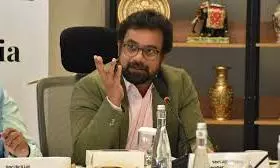
Indian delegation in Indonesia highlights contrast between India’s pluralism and Pakistan’s theocracy
text_fieldsDuring a public interaction with the Indian diaspora in Jakarta, Communist Party of India (Marxist) MP John Brittas strongly criticised Pakistan's ideological foundations and underlined the inclusive and secular nature of India.
His remarks came as part of an ongoing outreach by an all-party Indian parliamentary delegation visiting Southeast Asia.
"Pakistan is a theocratic state... They chose to be a nation in the name of a religion, and they are triggered by hate. India decided on its path. Two hundred million Muslims are in India, the second-largest Muslim community after Indonesia. This reflects the real character of India..." Brittas said, emphasising the ideological divergence between the two nations.
He reiterated India’s foundational commitment to pluralism and secular democracy, contrasting it with what he described as Pakistan’s state-sponsored promotion of terrorism.
"I am from Kerala. The unique nature of this delegation is that out of five political parties, three are against the ruling party, but we are here together for a mission. This represents the real culture of India. That is how India is distinct from Pakistan. India is a secular democracy, plural and diverse. Terrorism sponsored by the state is something more dangerous than an insurgency or a terrorist activity triggered by a criminal gang," he said.
Pointing to the diversity within the Indian delegation as a reflection of India's democratic coexistence, Brittas further stated, "Asim Munir said something about how Hindus and Muslims are different. Can you ever vouch for that? And Salman Khurshid is here... We are all together. I am from Kerala... I am a Christian. In Kerala, we have three major religions. We coexist in harmony. That is the message of India."
Brittas also condemned Pakistan’s ongoing involvement in terrorism, referencing public admissions by Pakistani leaders.
"Pakistan has been asking for evidence. Khwaja Asif, the defence minister of Pakistan, in an interview, said that they have been indulging in this dirty job of nurturing and harbouring terrorist organisations for three decades," he noted.
He emphasised India's preference for peace but warned that it cannot come at the expense of national security. "We don't require any more evidence... It's for all of us to see who is nurturing and harbouring terrorism. India wants peace... The Indus Waters Treaty gave 80% of the water to Pakistan. We had been cooperative with them... Still, Pakistan continued with the trajectory of sending across terrorists. That's why India decided that enough is enough. We want peace, but it shouldn't be at the cost of our precious lives..."
He concluded by highlighting the vigilance of India's armed forces and the global threat posed by terrorism. "Gandhiji said that he is a follower of Ahimsa, but soldiers must fight the battle to protect India.. You would have seen a scene in India during Operation Sindoor. Sophiya Qureshi and Vomika Singh flanked Vikram Misri. That is the poster of India... If you think that terrorism is inflicting India alone, it can turn up on the doorstep of any country anytime...."
The all-party delegation, led by JD(U) MP Sanjay Kumar Jha, includes representatives from across India’s political spectrum: Aparajita Sarangi (BJP), Abhishek Banerjee (Trinamool Congress), Brij Lal (BJP), John Brittas (CPI-M), Pradan Baruah (BJP), Hemang Joshi (BJP), Salman Khurshid and Mohan Kumar.
The delegation is scheduled to visit Indonesia, Malaysia, the Republic of Korea, Japan, and Singapore as part of India’s strategic outreach in the region.












